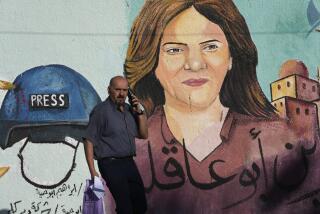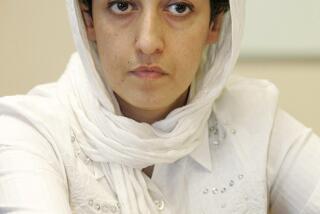Journalist’s Protest Underscores Regime’s Curbs on Civil Rights
- Share via
CAIRO — Tunisia is one of the Arab world’s most progressive countries when it comes to education and the rights of women, but when it comes to political criticism and dissent, it’s a different story.
For years, the harsh treatment of opponents and the stifling of the press by the regime of President Zine el Abdine ben Ali have been an open secret.
But now one Tunisian journalist in the normally placid North African country has decided to say “Enough” and has been risking his life in a hunger strike to draw attention to the lack of basic freedoms.
Taufik ben Brik’s lonely protest began without fanfare one month ago. Since then, he has shed more than 40 pounds and has been hospitalized several times. And he has been transformed into a hero at home and, increasingly, to Arab journalists everywhere.
“The Tunisian government has already lost a lot in this case,” said Virginie Locussol, from Reporters Without Borders, a French-based press freedoms group.
“Everyone in France, as well as in countries like Algeria, Morocco and Egypt, are in complete solidarity with him.”
The hunger strike began April 3 in response to what Ben Brik said was two years of official harassment for articles he had written for several European publications. He writes for the French Roman Catholic newspaper La Croix and two European news agencies.
His passport has been confiscated, his phones have been cut off, his brother recently has been put under arrest, lawyers and supporters have been roughed up by police trying to meet with him, and he has been beaten by unidentified men with bicycle chains.
Responding to a mounting tide of bad publicity, state authorities in Tunisia on Wednesday relented and gave Ben Brik permission to leave the country. He flew to Paris on Thursday evening and was immediately hospitalized, but he vowed to continue his hunger strike there to press the Tunisian government to release his brother Djallel, who was sentenced to three months in prison Wednesday.
The Tunisian government has lambasted Ben Brik, and he remains officially under investigation for allegedly disseminating “false information liable to incite public disorder” and “defamation of authorities.”
The struggle of the 39-year-old Ben Brik has drawn sympathy and letters of protest from throughout the Arab world, a region where respect for civil rights is often tenuous.
“He wants, along with all his compatriots, to be treated like a citizen, a human being, as the constitution stipulates. But the regime treats him like a hunted creature,” wrote Abdelwahhab Badrakhan, a columnist for the London-based Al Hayat newspaper.
Ben Brik has lost one-fourth of his body weight and is suffering from exhaustion, his wife, Azza, told reporters from a pay phone outside their home this week.
The hunger strike comes at a sensitive time, just after the death of the man whom Ben Ali ousted from power in 1987, former President Habib Bourguiba, the anti-France freedom fighter and architect of Tunisia’s independence.
The funeral three weeks ago in Bourguiba’s hometown witnessed rare public chants against Ben Ali by some mourners, according to unofficial reports. And a decision by state television not to broadcast the rites fueled widespread resentment.
State television and state-controlled newspapers also have tried to suppress news of Ben Brik’s protest, but the penetration of satellite broadcasts into Tunisian homes means that the previously unknown writer has become a national celebrity.
Defenders of Ben Ali point to Tunisia’s economic and social progress--about 60% of the citizens can claim to be middle class, health care and schools are of a high standard, and women serve as government ministers and are prominent in the professions.
Also, Tunisia has avoided the kind of political turmoil that has beset its neighbors, notably Algeria.
“Of course we would like to have a better record of human rights, but we can go about it slowly,” argued one Tunisian journalist, asking not to be identified. “Human rights is not only the freedom of expression. Look at our economy: 80% of Tunisians own their homes. . . . There are no beggars on the street. These are human rights too.”
But there are signs that Ben Ali’s accomplishments in creating a relatively tolerant, pro-Western country on the south shore of the Mediterranean are starting to be reevaluated both at home and abroad because of the heavy-handedness of his secret police.
In an editorial Tuesday, Le Monde newspaper of Paris said the government of Ben Ali is looking like “a stifling and probably dangerous anachronism.”
More to Read
Sign up for Essential California
The most important California stories and recommendations in your inbox every morning.
You may occasionally receive promotional content from the Los Angeles Times.













